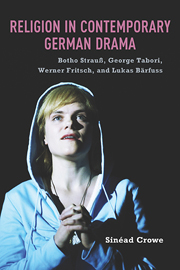 Religion in Contemporary German Drama
Religion in Contemporary German Drama Book contents
- Frontmatter
- Contents
- Acknowledgments
- Introduction: Definitions and Themes
- 1 The Relationship between Theater and Religion
- 2 Religion in Modern European Theater and Drama
- 3 “No One Wants to Get to God Anymore”? Botho Strauß's Groß und klein and Die eine und die andere
- 4 Theological Farce: George Tabori's Mein Kampf
- 5 “The Last Refuge for Metaphysics”: Werner Fritsch's Theater Theory
- 6 “The Feeling of Faith”: Fritsch's Wondreber Totentanz and Aller Seelen
- 7 Belief and Unbelief in the Twenty-First Century: Lukas Bärfuss's Der Bus (Das Zeug einer Heiligen)
- Conclusion
- Bibliography
- Index
2 - Religion in Modern European Theater and Drama
Published online by Cambridge University Press: 05 May 2013
- Frontmatter
- Contents
- Acknowledgments
- Introduction: Definitions and Themes
- 1 The Relationship between Theater and Religion
- 2 Religion in Modern European Theater and Drama
- 3 “No One Wants to Get to God Anymore”? Botho Strauß's Groß und klein and Die eine und die andere
- 4 Theological Farce: George Tabori's Mein Kampf
- 5 “The Last Refuge for Metaphysics”: Werner Fritsch's Theater Theory
- 6 “The Feeling of Faith”: Fritsch's Wondreber Totentanz and Aller Seelen
- 7 Belief and Unbelief in the Twenty-First Century: Lukas Bärfuss's Der Bus (Das Zeug einer Heiligen)
- Conclusion
- Bibliography
- Index
Summary
IN 1888, AUGUST STRINDBERG declared that both religion and theater were on the verge of extinction in an increasingly rationalistic world. “Nowadays,” he wrote, “the primary process of intuition is giving way to reflection, investigation and analysis, and I feel that the theater, like religion, is on the way to being discarded as a dying form which we lack the necessary conditions to enjoy.” Yet Strindberg himself became one of the many modern dramatists and theater-practitioners whose work was heavily influenced by religion. Ironically, proponents of one “dying form” began looking for inspiration to another cultural form that no longer plays the pivotal role in Western society that it used to.
This chapter is not intended to provide an exhaustive synoptic survey of religion in modern theater. Instead, I want to explore some of the key ways and characteristic forms in which religion informed European theater and drama from the late nineteenth century to the 1960s, focusing on the following: first, the aestheticized religiosity of early antirealist theater, in particular symbolist theater; second, the quest for spiritual regeneration portrayed in the dramas of Strindberg and the expressionists; third, the ritualistic “holy” theater of Artaud and Grotowski; and fourth, the dramatization of the absence of religious meaning in the work of Samuel Beckett. As indicated in the introduction to this book, I do not examine dramas that interrogate the political and economic aspects of religion.
- Type
- Chapter
- Information
- Religion in Contemporary German DramaBotho Strauß, George Tabori, Werner Fritsch, and Lukas Bärfuss, pp. 23 - 48Publisher: Boydell & BrewerPrint publication year: 2013


